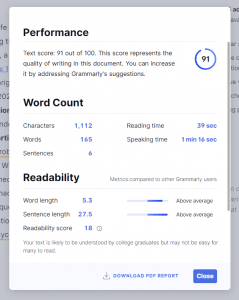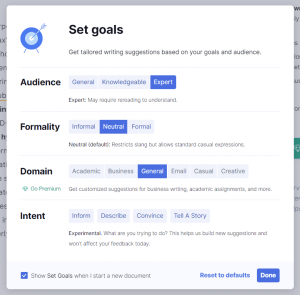If you’ve worked with someone on your writing–either me, another writing coach, or a consultant at the USC Dornsife Writing Center–you might have noticed that we tend to focus on “big picture” concerns (sometimes called higher-order issues) like argument, structure, and organization over discrete grammatical issues. I think this is important because, unless a grammatical error gets in the way of the meaning or understanding of what you’re trying to say, the argument of your paper is what your audience will care about the most.
That being said, grammar can be important–especially if you are writing in a second or third language, or if you are heading into a professional career where your colleagues and bosses will expect that all of your writing is polished.
A lot of students already use grammar checkers. Software like Grammarly can be useful, but it’s a lot more useful if you use it with intention and are clear about what you are trying to do. Here are a few tips for getting the most out of Grammarly, and some examples of what I’m talking about.
1. Ignore the score
If you’re using the actual Grammarly app, you’ll see a box in the top right corner of your workspace that assigns your writing a score.

The information that you get when you click on that score can be helpful (word count, for instance), but the comparative data isn’t. Your words and sentences being longer or shorter than “the average Grammarly user” doesn’t really say much. Even something like the “readability score” at the bottom probably won’t be very useful to you (it uses a readability test that can be helpful for determining macro-level trends across thousands of documents but is less important for your one paper).
2. Set goals (but not necessarily those ones)
One of Grammarly’s features allows you to specify the audience that you are writing for, the level of formality that you want to write in, and the “domain” that you are writing in (academic, business, creative, etc.).

To be honest, I don’t think there’s anything wrong with this feature–I just think that you can do it better than a computer can. It is important to consider your audience. Instead of thinking about audience on a general-to-expert spectrum, though, consider the different expectations of your audience and the different reasons that they might be reading your work. Are they looking for some kind of background, descriptive information? Are they looking for what you have to say within some broader conversation? Will they likely already agree or disagree with you? Are their goals the same as yours? Are they looking to answer a question, make a policy decision, or something else?
Also, “formality” is a shell game. If you’re concerned about writing the “right way” for the thing you are writing for, look for specific examples to learn what writers get away with. If you want to publish in a particular journal, check out other articles posted in that journal. If you are prepping for a live presentation, look for context clues to see how formal they expect you to be.
3. Try to figure out what it wants from you
One reason that some writing instructors are hard on grammar checkers is that proprietary edu-tech makes its money by not telling you how it does what it says that it does. But it isn’t always so hard to figure out, at least at a basic level. Do you notice that he software seems to encourage longer or shorter sentences? Does it usually tell you to use a shorter word or is it ever asking you to increase the complexity of your writing? It is incredibly helpful to notice if you keep getting the same advice from the software; first, though, you should ask yourself whether the thing that it is trying to encourage you to do is something that you actually want to do.
4. Don’t *just* use Grammarly
The absolute best thing that grammar-checking software can do is teach you about the things that you do and do-wrong that you didn’t already know you did and did-wrong. That’s what makes grammar difficult–how are you supposed to fix a thing that you don’t know needs fixing? So, when you notice Grammarly flagging the same issue over and over again for you, seek an outside resource to do something about it. If Grammarly gives you a name for the thing you keep doing (e.g. “incorrect subject-verb agreement,” “incorrect article usage,” or “inconsistent verb-tense”) look it up somewhere else to find more examples of what that thing looks like and what to do about it. One of the best is Grammar Girl. Just search the terms that Grammarly keeps throwing at you.
Also–better yet–come see me! I’m happy to help with any grammar issues that you keep running into. In fact, a great way to improve your grammar is to identify persistent issues with something like Grammarly, work with someone else (like me) to figure out why that problem keeps coming up and what to do about it, and then check your writing again to see if you are still making the same mistakes.
